by bestevez | Feb 5, 2024
September 1st serves as the start of the new 4-H year and the first week of October serves as National 4‑H Week each year. Throughout Florida and especially in the Panhandle, the first month of the 4-H year is full of events, activities, and social media posts to celebrate the impact of 4‑H. Once the start of the new year and National 4-H Week are over however, momentum for the program can ebb and flow. Here are 10 ways that you can continue to celebrate and promote 4-H in your club and county.
- Give Back
Local programs are always looking for resources to continue growing their programs. From serving food, to collecting essential items, to making a donation, 4-H members can help provide resources and serve their communities.
- Wear your 4-H Gear
Nothing says 4-H pride like wearing a 4-H clover. Dress yourself (or the entire family-including your pets) in 4-H green and 4-H gear, available at Shop 4-H.
- Set up Informational Booths
If your local grocery store or hardware store allows, set up a table to share information about your local 4-H program or club. You can display 4-H posters, hand out flyers, or showcase the work of local 4-H members. 4-H has long-standing partnerships with Tractor Supply Co. and Joann Fabric and Craft Stores.
- Highlight your 4-H Members
Share social media posts about your 4-H members and their accomplishments. 4-H clubs, counties, and even the NW 4-H District all have social media pages that showcase 4-H accomplishments. Take to social media to share a 4-H memory, express how 4-H shaped who you are today, describe what 4-H means to you, post an old 4-H photo, or shout-out your 4-H club.
- Become a 4-H Volunteer
If you are a 4-H alum, you might be looking for ways to reconnect with 4-H. Consider giving your time to a local 4-H club by becoming a volunteer.
- Showcase Your 4-H Work at a Local Fair
The Fall is Fair Season in the NW District. 4-H members can submit booths, entries, livestock, and a variety of other things into local and regional fairs. Even if you don’t submit anything, many of our local fairs have judging contests to participate in.
- Prepare for Judging Teams and Competitive Events
4-H has a variety of judging teams and competitive events that are offered year-round. These opportunities are great ways to learn a specific skillset and work on teamwork, leadership, and communication skills. While many of these teams and events are in the springtime, you can start to prepare now to be ready when they start.
- Have a 4-H Reunion
4-H alumni often credit 4-H for the connections they have made, remembering the friends they made and those who they may still keep in touch with today. Gather your old 4-H friends and spend some time together reminiscing on your 4-H experience or recreate your 4-H project together.
- Send a 4-H “Thank You”
We all have a reason to thank our local 4-H leaders and volunteers. Whether you grew up in 4-H, you have kids in 4-H, you are in 4-H, or you’ve witnessed the positive work of 4-H in your community, send a “thank you” note to your local Extension Office to show your appreciation.
- Try Something New
4-H is an organization that helps youth start a new skill or allows them to try a different interest. Do you want to dabble in fashion? Get a taste of cooking? Build a Lego robot? Ride a horse? 4‑H is the place to where all these things are possible.
by Heather Kent | Oct 12, 2023
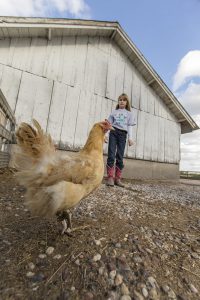 Because of our mild weather in Florida, nearly every season is fair season! County, regional, and state fairs occur throughout the fall, winter, and spring in our sunshine state. However, most county and regional fairs in the panhandle are in the fall. Fairs are an important component of the project experience. They provide opportunities for youth to demonstrate their project knowledge and skills. Livestock shows, judging contests, and exhibits are three ways youth are encouraged to develop communication and problem-solving skills associated with their project. To help our families prepare for the fair season, we have curated several resources:
Because of our mild weather in Florida, nearly every season is fair season! County, regional, and state fairs occur throughout the fall, winter, and spring in our sunshine state. However, most county and regional fairs in the panhandle are in the fall. Fairs are an important component of the project experience. They provide opportunities for youth to demonstrate their project knowledge and skills. Livestock shows, judging contests, and exhibits are three ways youth are encouraged to develop communication and problem-solving skills associated with their project. To help our families prepare for the fair season, we have curated several resources:
Livestock Shows- if you are new to livestock shows, you may feel a little overwhelmed. This article has some very helpful tips on making sure you are prepared- whether you are showing a large animal (such as a steer) or a small animal (such as a rabbit). The article also includes a downloadable packing list, as well as a list of supplies you may want to have on hand for a “show box.” A show box is a container where you store all of your show supplies.
Judging Contests– Juding contests help youth develop critical thinking skills. Fairs typically offer a variety of judging contests- from agriculture, livestock, poultry, horticulture, and even consumer choices. If you want to learn the basics of judging contests, check out this article and video. If you are interested in agriculture or livestock judging, check out this article for a list of free, downloadable resources and local judigng opportunities.
Exhibits– Fairs are a great way to show off what you have done throughout the 4-H year. From individual project exhibits to club booth exhibits, there is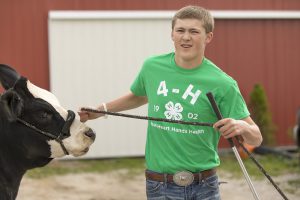 something for everyone. Check out our family guide to fair exhibits to know which types of exhibits are right for you! If you plan to submit exhibits to the North Florida Fair in Tallahassee, be sure to read this article which is a step-by-step guide to prepare your exhibits for that blue ribbon premium!
something for everyone. Check out our family guide to fair exhibits to know which types of exhibits are right for you! If you plan to submit exhibits to the North Florida Fair in Tallahassee, be sure to read this article which is a step-by-step guide to prepare your exhibits for that blue ribbon premium!
4-H Days at the Fair– most fairs offer a special day just for 4-H families. On this day, entrance into the fair is usually free for 4-Hers and features several judging contests and events to support 4-H project work. 4-H Day at the North Florida Fair is November 12th. Check out this article with tips and information you need to know before you go to 4-H day.
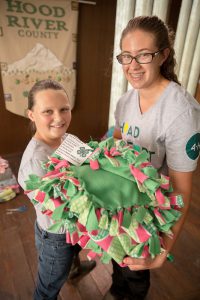 For more information about fairs in your area, or to help youth in your county make the most of thier local fair, contact your local UF IFAS County Extension Office.
For more information about fairs in your area, or to help youth in your county make the most of thier local fair, contact your local UF IFAS County Extension Office.
by Marcus Boston Jr. | Apr 13, 2023
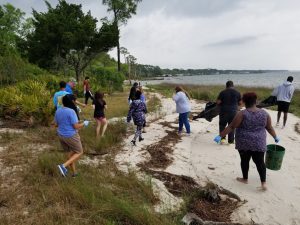 Life skills for youth are defined as a set of abilities and competencies that enable young people to successfully navigate their daily lives and achieve their goals. These skills are essential for personal and professional development and help “prepare youth to be responsible citizens and productive members of the workforce.” Florida 4-H provides many opportunities for young people to obtain life skills through project work, community and afterschool clubs, workshops, and leadership programs.
Life skills for youth are defined as a set of abilities and competencies that enable young people to successfully navigate their daily lives and achieve their goals. These skills are essential for personal and professional development and help “prepare youth to be responsible citizens and productive members of the workforce.” Florida 4-H provides many opportunities for young people to obtain life skills through project work, community and afterschool clubs, workshops, and leadership programs.
As a state-wide organization, Florida 4-H prioritizes the development of communication, higher-order thinking, and appreciation of differences. These three life skills are infused throughout our educational activities and programs because they are essential workforce skills. Below are a few examples of local programs that focus on helping youth develop life skills:
- Communication: 4-H provides opportunities for youth to develop their communication skills through the Florida 4-H Public Speaking Contest, demonstrations, and presentations at County/District and 4-H University. These activities help youth learn how to articulate their ideas clearly and confidently.
- Higher Order Thinking: this includes both decision-making and problem-solving.
- Decision-Making: 4-H offers various programs, such as judging contests at fairs, 4-H event planning committees (district/state council), and club activities that help youth develop their decision-making skills. These activities help youth learn how to make informed decisions and evaluate the outcomes of their choices.
- Problem-Solving: 4-H offers various programs, such as STEM projects and engineering challenges, that help youth develop problem-solving skills. These activities encourage youth to think creatively and find innovative solutions to complex problems.
- Appreciation of Differences– 4-H helps youth learn how to respect and communicate with people who might be different from themselves. Many of our programs offer opportunities for youth to meet new people and explore different cultures. We also help youth learn how to address conflict in a positive way through civil discourse. Older youth can participate in exchange programs with 4-Hers from other states and countries (4-H is in all 50 states and 32 other countries!).
- Teamwork: Through 4-H club projects, counselor training, and community service activities, youth learn how to work collaboratively with others towards a common goal, which helps them develop important teamwork skills.
- Responsibility: 4-H club projects and community service activities encourage youth to take responsibility for their actions and to learn the importance of following through on commitments.
- Leadership Development: 4-H offers various programs, such as officer training, public speaking, county/district councils, and community service projects, that help youth develop their leadership skills.
- Self-Confidence: 4-H programs provide a safe and supportive environment where youth can build their self-confidence through public speaking, leadership roles, and community service activities.
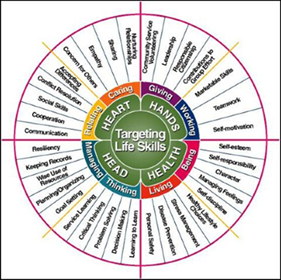
- Service Learning: Through 4-H club work, obtaining a Florida 4-H Community Pride Grant, and active membership on county/district councils, youth members take part in projects and experiences that help them how to become active participants in the communities and apply their experiences to real-life situations.
These are not the only life skills youth in Florida can learn and practice through 4-H- but they are part of almost every program we offer. These are examples of the priority life skills that Florida 4-H promotes among youth, with a focus on cognitive development, interpersonal skills, leadership, civic engagement, and practical skills. Florida 4-H aims to provide a comprehensive youth development program that equips young people with the skills they need to succeed in their personal lives, careers, and communities. Active involvement in 4-H will help members to connect life skills obtained through their 4-H involvement to real-life experiences. For more information on these youth leadership opportunities please contact your local 4-H office.
If you would like to help Florida 4-H teach life skills, or get your child involved in our program, reach out to your local UF/IFAS County Extension Office. There is an office in every county in Florida. Spring is a great time to get involved, because 4-H offers several summer programs for youth to develop life skills!
References:
Marilyn N. Norman and Joy C. Jordan.2018.Targeting Life Skills. EDIS document #4HSFS101.9
Hendricks, P.(1988). Developing Youth Curriculum Using The targeting Life Skills Model
Michigan State Extension. 2016. 4-H Head Life Skill Sheets.(4-H1679)
by Heather Kent | Jul 28, 2022
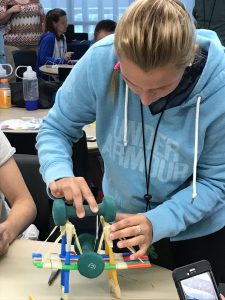 Whether you are a teen helping with a day camp, or an adult leading a club- it helps to have some tips and tricks in your back pocket to teach the content you want 4-H members to learn. 4-H volunteers and professionals often find themselves teaching a wide variety of audiences with different needs for learning. Trying to meet all those needs can sometimes seem overwhelming, but this week and next, our blog will focus on six specific strategies that will make this much easier- especially with practice! This blog post will discuss and give examples of three teaching strategies that can up your teaching and facilitation game- spacing, interleaving, and retrieval practice.
Whether you are a teen helping with a day camp, or an adult leading a club- it helps to have some tips and tricks in your back pocket to teach the content you want 4-H members to learn. 4-H volunteers and professionals often find themselves teaching a wide variety of audiences with different needs for learning. Trying to meet all those needs can sometimes seem overwhelming, but this week and next, our blog will focus on six specific strategies that will make this much easier- especially with practice! This blog post will discuss and give examples of three teaching strategies that can up your teaching and facilitation game- spacing, interleaving, and retrieval practice.
Why Bother? Isn’t the 4-H Curriculum “Good Enough?”
Some 4-H curricula have teaching strategies embedded within them. Some just have activities structured to help youth learn content. Learning and applying a few of these teaching strategies will make your teaching more interesting and engaging to a wider range of 4-H members. Engagement + interest = more fun for everyone!
Spacing
The term “spacing” simply means to spread learning out over time. When information is learned over the course of several weeks, months, or even years, youth (and adults) are more likely to retain that information than if it were dumped on them over several hours or days. This is why 4-H projects are so effective- youth often stay with the same project for one or more years, learning more complex information each year until they have mastered the content. Some project work even leads to future careers.
Here is an example of how you might apply spacing to the youth you work with in 4-H: One of the things youth want to do this year is participate in the Consumer Choices contest. Rather than teaching a marathon Saturday workshop the week before the contest, start early and introduce the concepts slowly either as part of a club meeting or an extra session before or after the regular club meeting time.
- Meeting #1- Explain why consumer skills are essential, what the topics for this year’s contest are, and the contest rules
- Meeting #2- Review cell phone plans and portable speakers (two of the topics). Demonstrate how to fill out a judging card and practice judging situations for cell phone plans and speakers.
- Meeting #3- Review ground transportation and smoothies (two more topics). Review how to fill out a judging card and practice judging situations.
- Meeting #4- Explain what oral reasons are- have an older youth demonstrate or what videos of youth giving oral reasons. Next, hold a mock contest and let youth practice giving oral reasons.
Interleaving (not to be confused with interweaving)
Interleaving means switching between topics. This allows youth opportunities to practice life skills in different situations. This helps reinforce the life skills that we teach in 4-H. For example, judging contest strategies are the same- it’s just the content that changes from contest to contest. Judging contests help youth learn about different topics, but the real value is they are learning how to think critically, communicate clearly, and work as a team. Applying those same skills to different subject matter helps youth learn lifelong skills (not just how to regurgitate facts). Here’s an example of interleaving that builds on the consumer choices example above:
The youth you work with will also want to learn about robotics, so you introduce an activity from the 4-H Junk Drawer Robotics curriculum. You divide the youth up into groups of three to complete a challenge to build a robot that draws. While teaching, refer back to what youth learned about critical thinking when they competed as a team in consumer choices. What did they learn about communication and teamwork? Ask them to apply those lessons to this situation when building a robot.
Retrieval Practice
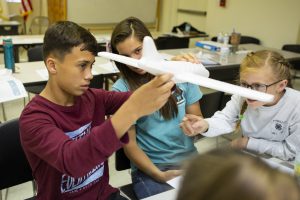
4H youth work together in a drone course. Photo taken 10-15-18.
One of the best ways to strengthen your memory is to practice retrieving that information from your brain! Many of our 4-H curricula include games that allow youth to practice information retrieval. Quiz bowls and skill-a-thon stations are two great ways to incorporate retrieval practice. Here is an example of retrieval practice that builds upon the consumer choices example:
Youth enjoyed participating in the consumer choices contest and asked if they could do more activities like that. Your local 4-H agent suggested a program called “Living on My Own” which is a financial simulation that helps teach financial literacy skills. As the youth rotate through the stations, they retrieved and practiced some of the consumer skills they learned earlier as they decided on housing, transportation, food, and other items based on their simulated salary and living situation. Being about to recall and practice these skills helps reinforce financial literacy.
One of the best things about 4-H is it is learner-centered. That means that youth can choose what they want to do and learn in 4-H. Your local 4-H Extension Office can help you find the best curriculum to support your youths’ learning needs, but the curriculum is only part of learning. 4-H supports learning (usually referred to as a project) through a variety of competitive and non-competitive events. The three strategies described in this post can help volunteers and 4-H professionals link learning between projects and activities. Next week’s post will explore three more strategies for teaching youth- elaboration, concrete examples, and duel coding.
References:
- Potter, S. (2021). Educational Design and Delivery – Utilization of Multiple Teaching Strategies. 4-H VKRC Fact Sheets.
- Weinstein, Y., Madan, C. R., & Sumeracki, M. A. (2018). Teaching the science of learning. Cognitive Research: Principles and Implications, 3, 2. https://cognitiveresearchjournal.springeropen.com/articles/10.1186/s41235-017-0087-y
- Weinstein, Y, Sumeracki, M & Caviglioli, O (2019) Understanding how we learn: A visual guide. Routledge, Abingdon, Oxon, UK.
by pmdavis | Jun 17, 2022
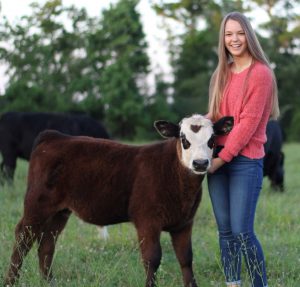
Taylor Yoder
Taylor Yoder is the daughter of David and Robin Yoder of Altha, FL. Taylor is a senior and has been homeschooled along with her 3 sisters. Her plan after graduating is to attend Chipola College and then pursue an ag business degree.
Taylor has been a member of the Jackson County 4-H club since 2017. Some of the events she has been a part of include Chopped Challenge, Holiday bake-offs, arts and crafts contest though the Panhandle Youth Expo, and is an active member of the livestock club. As a member of the livestock club, Taylor has participated in numerous judging contests across the Southeast. Her team was the third-place team in the 2022 state 4-H contest. In addition, she was the overall high individual in this contest.
In addition to these activities, Taylor helped start and holds a leadership role in the Jackson County Junior Cattleman’s Association, she has been a two-time state voting delegate for Jackson County 4-H, and is a board member for the Junior Florida Simmental Association.
Taylor is most passionate about cattle breeding, showing, and judging. Taylor had the reserve grand champion steer at the North Florida Fair in 2021 and exhibited the grand champion steer at this fair in 2022. She has also participated in the PYE steer show since 2017 and had the reserve champion steer in 2021. She has also won best county raised steer three times.
The thing that means the most to Taylor from being a part of 4-H is that it has prepared her to be able to face a challenge with confidence. Her time showing, judging, and giving reasons has helped to instill this confidence in her. These activities have created a love for cattle and has helped shape what her future will involve. Lifelong friendships and connections across the state have also played a huge role in her desire to pursue future endeavors in the cattle industry.
This story prepared by Patti Peacock, Jackson County 4-H








